Search Result
Results for "
antiangiogenic effects
" in MedChemExpress (MCE) Product Catalog:
6
Isotope-Labeled Compounds
| Cat. No. |
Product Name |
Target |
Research Areas |
Chemical Structure |
-
- HY-P99330
-
|
Anti-Human VEGFA Recombinant Antibody; RO5520985
|
VEGFR
Tie
|
Cancer
|
|
Vanucizumab is a first-in-class, bispecific IgG1-like monoclonal antibody that simultaneously blocks VEGF-A and angiopoietin-2 (Ang-2) from interacting with their receptors. Vanucizumab has antiangiogenic and anticancer effects .
|
-

-
- HY-14658A
-
|
(S)-(-)-Thalidomide
|
Apoptosis
Molecular Glues
|
Metabolic Disease
Inflammation/Immunology
|
|
(S)-Thalidomide ((S)-(-)-Thalidomide) is the S-enantiomer of Thalidomide. (S)-Thalidomide has immunomodulatory, anti-inflammatory, antiangiogenic and pro-apoptotic effects . (S)-Thalidomide induces teratogenic effects by binding to cereblon (CRBN) .
|
-
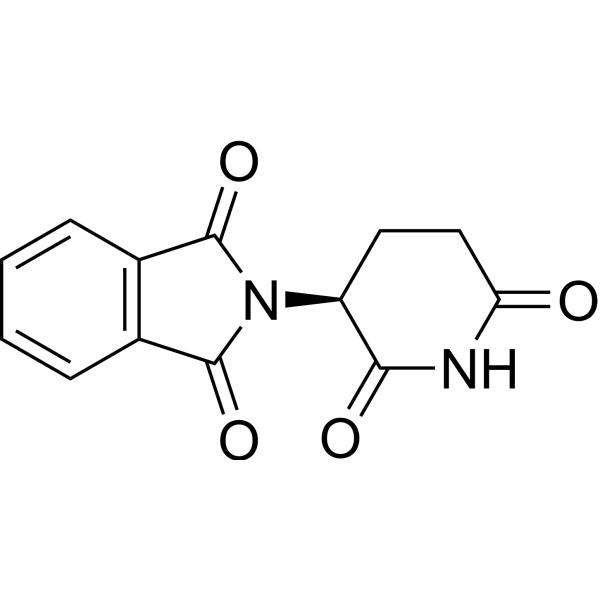
-
- HY-13705
-
-
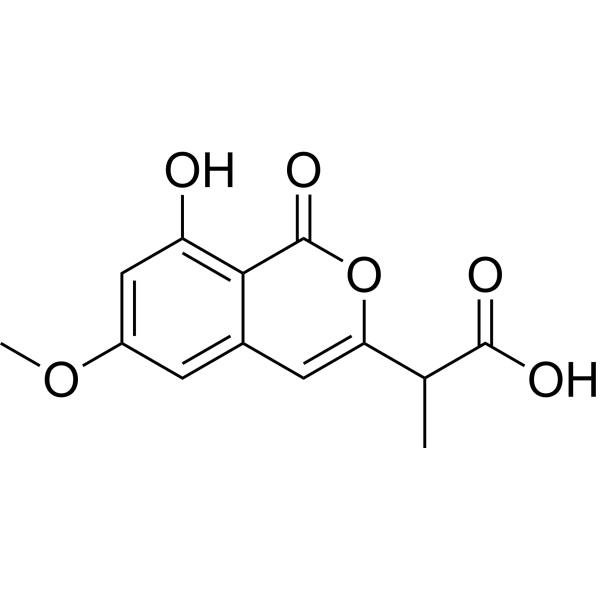
-
- HY-N7830
-
|
|
ERK
|
Cancer
|
|
7α,15-Dihydroxydehydroabietic acid is a natural abietane-type diterpenoid with antiangiogenic effects .
|
-
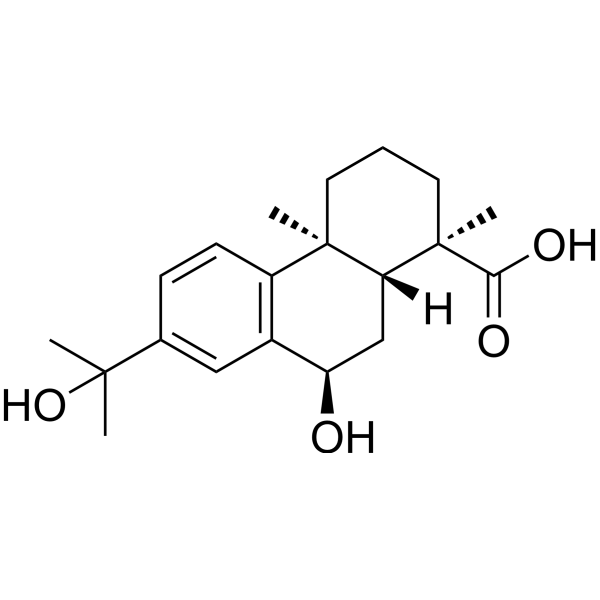
-
- HY-114785
-
|
|
MMP
|
Cancer
|
|
BPHA is a potent and orally active MMP-2, MMP-9 and MMP-14 inhibitor with IC50s of 12 nM, 16 nM and 17 nM, respectively. BPHA does not inhibit MMP-1, -3, and -7 (the IC50s are 974, >1000, and 795 nM, respectively). BPHA has antiangiogenic and antitumor effects .
|
-
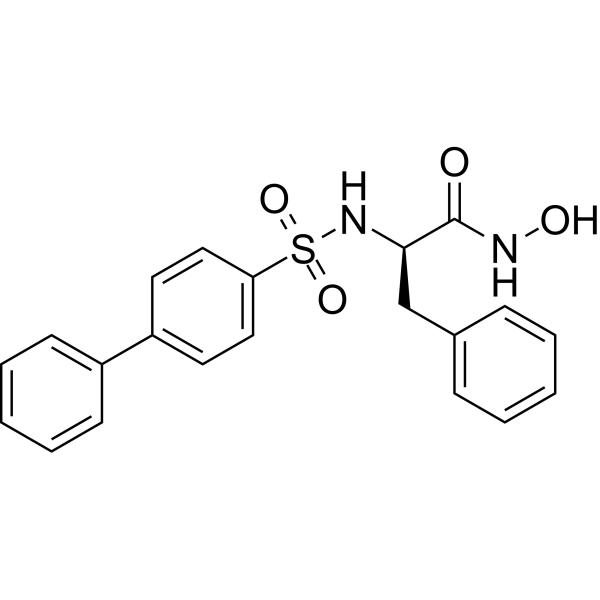
-
- HY-B0421
-
-
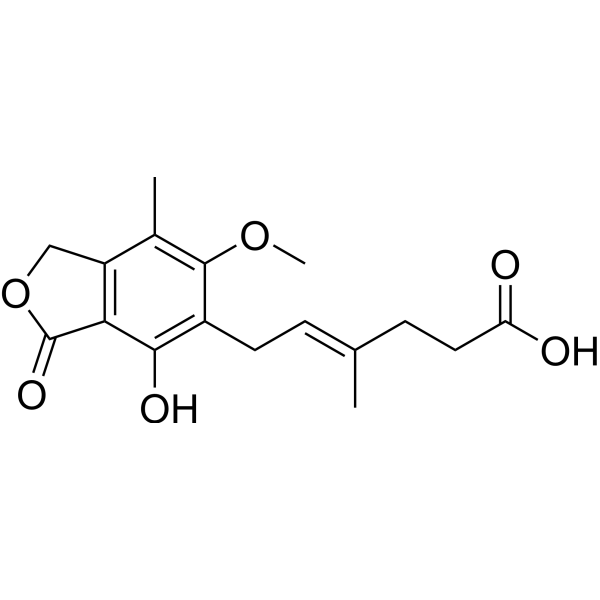
-
- HY-B0421A
-
-
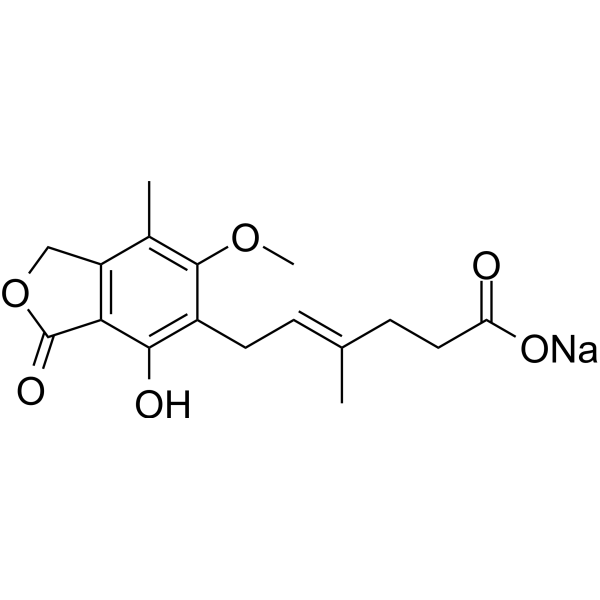
-
- HY-139822
-
|
|
VEGFR
|
Cancer
|
|
VEGFR-2-IN-10 exhibits increased antiangiogenic potency (IC50 = 0.7 μM) against VEGF-induced VEGFR2 phosphorylation without cytotoxic effects.
|
-
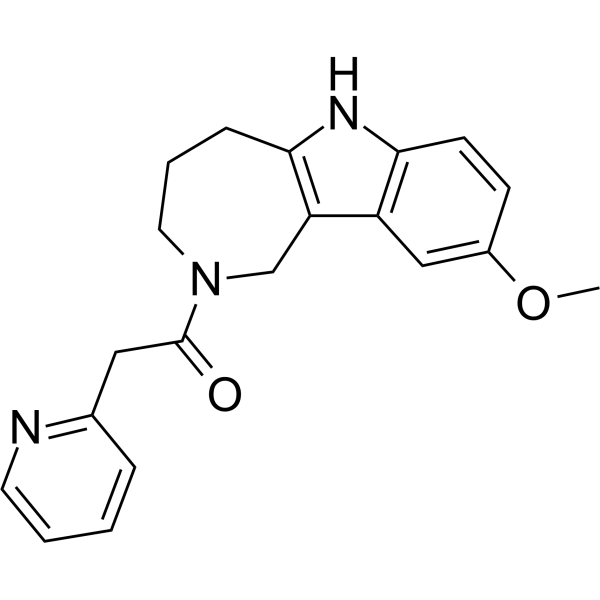
-
- HY-N0205
-
|
Anemoside B4
|
Others
|
Cancer
|
|
Pulchinenoside C (Anemoside B4) is Pulsatilla koreana Nakai that have many numerous biological effects in vitro, including enhancing hypoglycemic, anti-tumor, neuroprotective and anti-angiogenic activity.
|
-
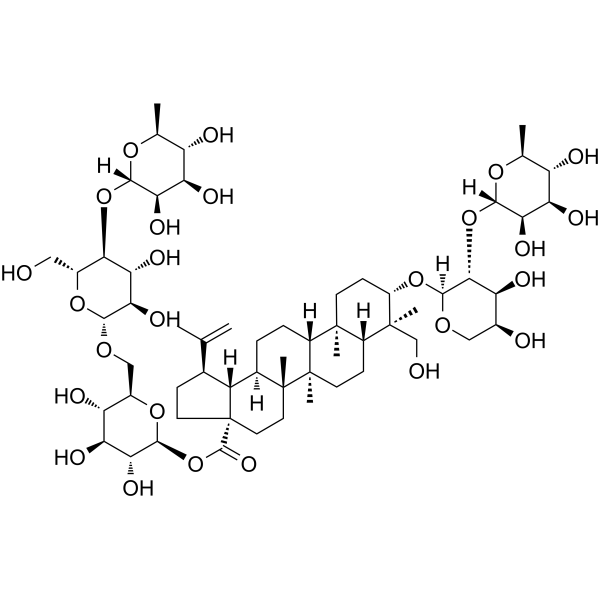
-
- HY-16126
-
|
L-651582; CAI
|
Calcium Channel
|
Inflammation/Immunology
Cancer
|
|
Carboxyamidotriazole (L-651582) is a cytostatic inhibitor of nonvoltage-operated calcium channels and calcium channel-mediated signaling pathways. Carboxyamidotriazole shows anti-tumor, anti-inflammatory and antiangiogenic effects .
|
-
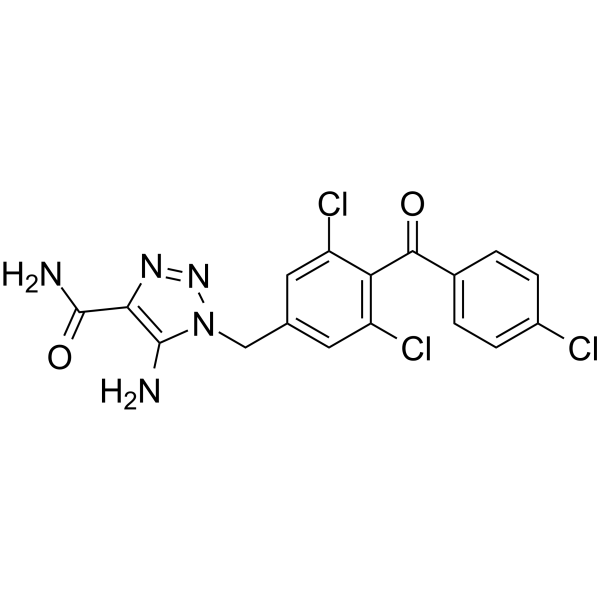
-
- HY-151241
-
|
(+)-Sinomenine N-oxide
|
Others
|
Inflammation/Immunology
|
|
Sinomenine N-oxide has anti-angiogenic, anti-inflammatory and anti-rheumatic effects. Sinomenine N-oxide is also a NO production inhibitor, with an IC50 value of 23.04 μM .
|
-
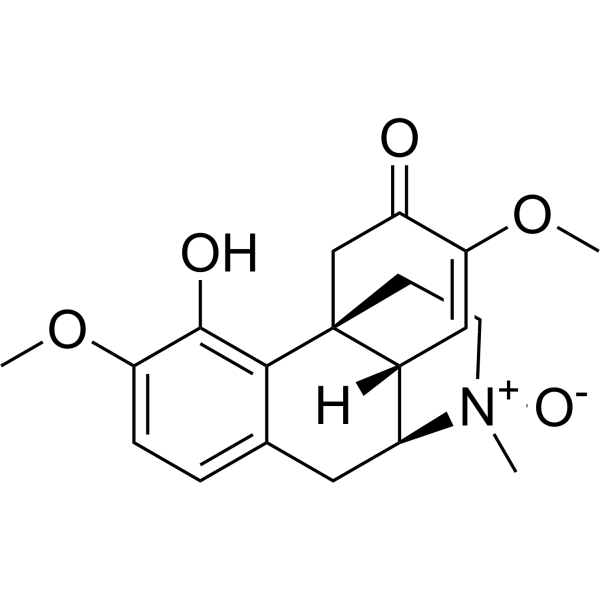
-
- HY-N0005S
-
-
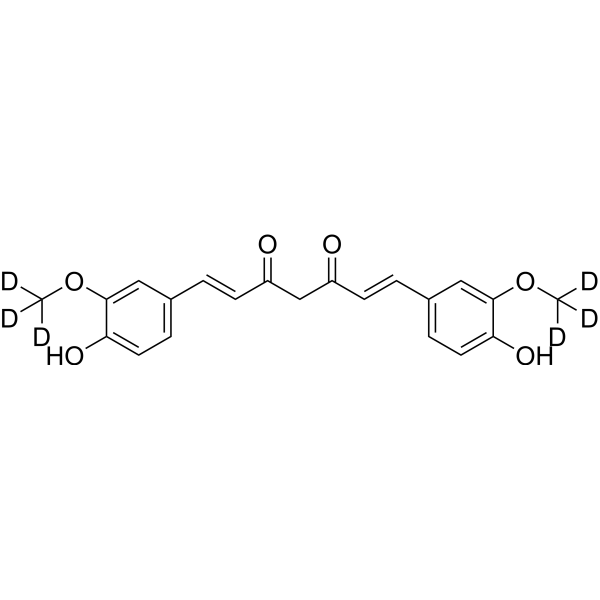
-
- HY-P9928
-
|
REGN 727; SAR 236553
|
Ser/Thr Protease
|
Cardiovascular Disease
|
|
Alirocumab (REGN 727) is a human monoclonal antibody inhibitor of PCSK9. Alirocumab is a monoclonal antibody. Alirocumab has anti-inflammatory, antiangiogenic and antioxidant effects. Alirocumab can be used in the study of hypercholesterolemia .
|
-
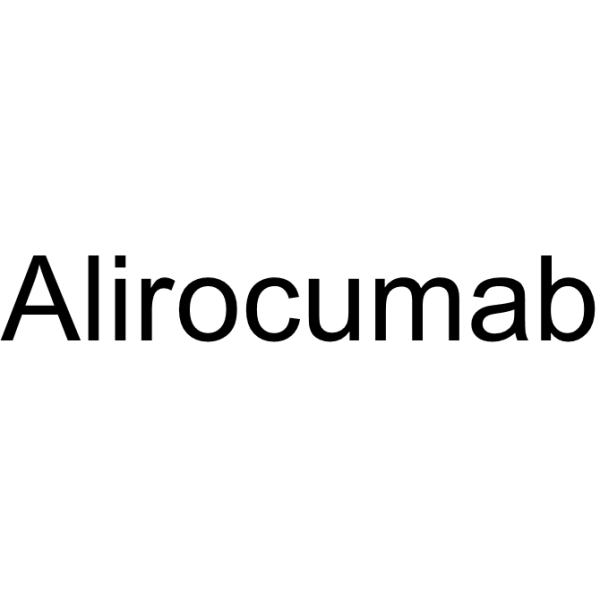
-
- HY-N2165
-
-
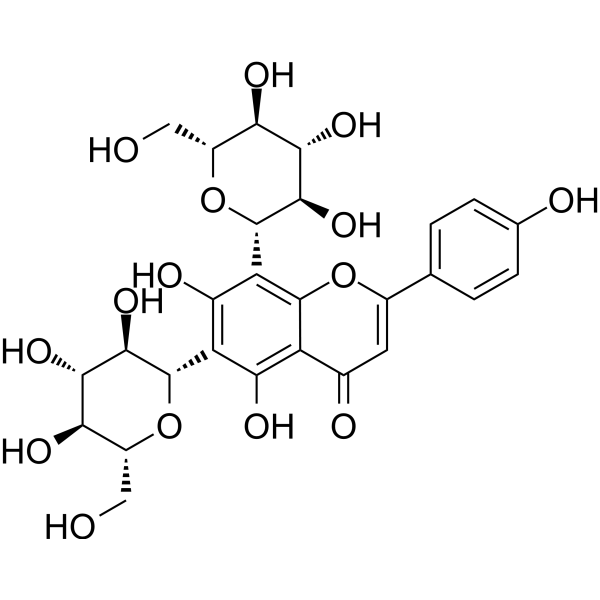
-
- HY-143491
-
|
|
VEGFR
Apoptosis
Reactive Oxygen Species
|
Cancer
|
|
VS 8 (Compound VS 8) is a potent, orally active VEGFR-2 inhibitor with significant anti-angiogenic effects. VS 8 induces cancer cell apoptosis and migration. VS 8 is active against CSCs (Cancer stem cells) .
|
-
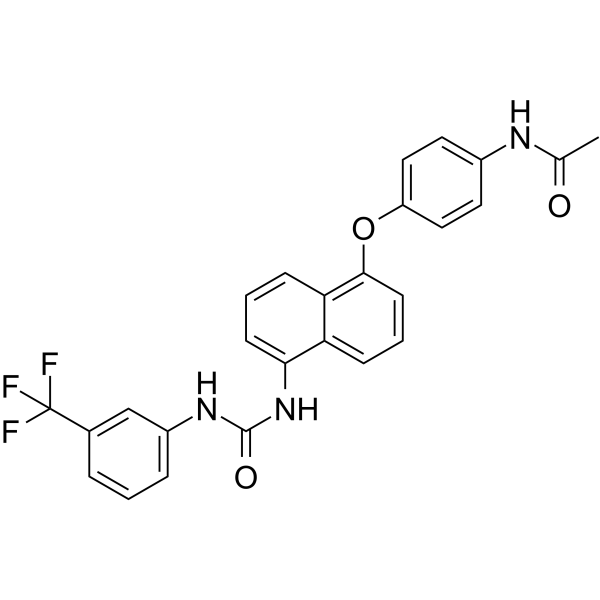
-
- HY-152087
-
|
|
ERK
p38 MAPK
|
Cardiovascular Disease
|
|
DCZ19931 is a potent multi-targeting kinase inhibitor. DCZ19931 has anti-angiogenic effects on ocular neovascularization. DCZ19931 also inhibits ERK1/2-MAPK and p38-MAPK signaling .
|
-
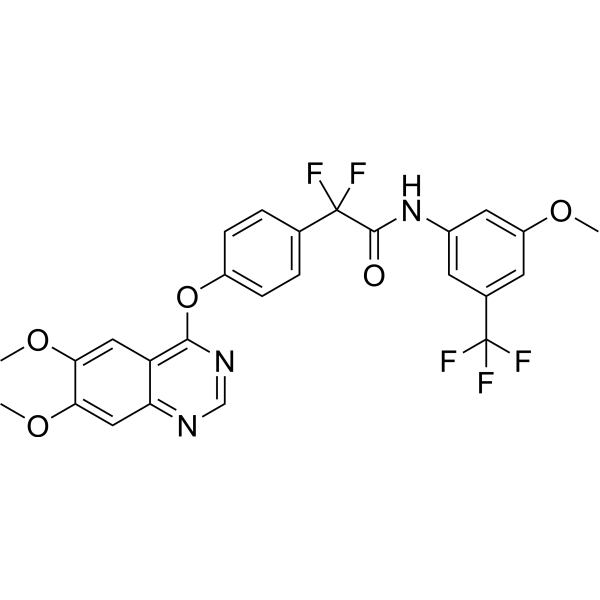
-
- HY-16135A
-
|
ESK981 tosylate; BOL 303213X tosylate
|
VEGFR
FGFR
|
Others
|
|
CEP-11981 (tosylate) (ESK981 (tosylate), BOL 303213X (tosylate)) is an orally active tyrosine kinase inhibitor (TKI), which can target TIE2, VEGFR1-3 and FGFR1, and has potential anti-tumor and anti-angiogenic effects .
|
-
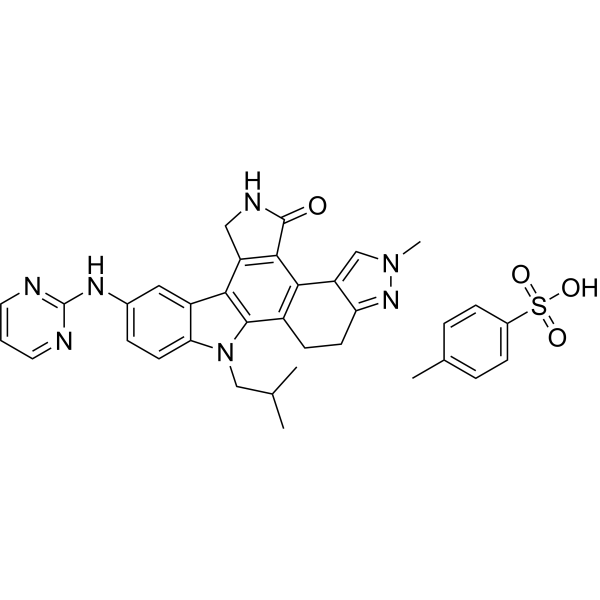
-
- HY-16147
-
|
Oxi4503; CA1P; Combretastatin A1 diphosphate
|
Others
|
Cancer
|
|
Combretastatin A1 phosphate (Oxi4503; CA1P; Combretastatin A1 diphosphate) is a potent vascular disruptive agent. Combretastatin A1 phosphate exerts anti-angiogenic effects on tumors. Combretastatin A1 phosphate has the potential for the research of pancreatic neuroendocrine tumors .
|
-
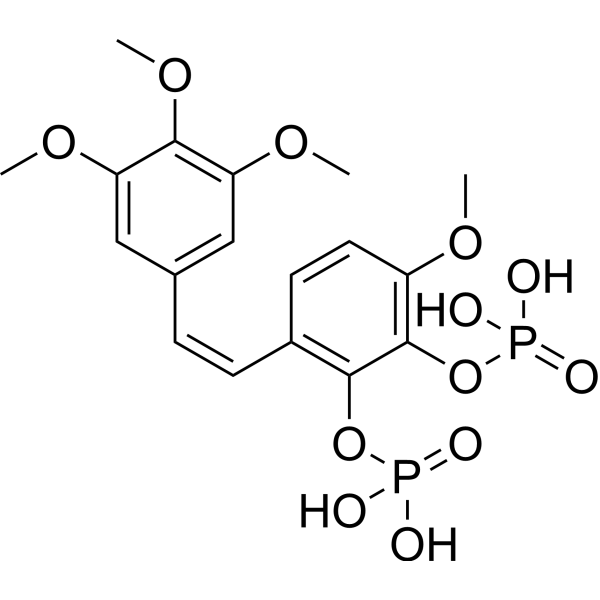
-
- HY-16135
-
|
ESK981; BOL 303213X
|
VEGFR
FGFR
|
Cancer
|
|
CEP-11981(ESK981; BOL 303213X) is an orally active tyrosine kinase inhibitor (TKI), which can target TIE2, VEGFR1-3 and FGFR1, and has potential anti-tumor and anti-angiogenic effects .
|
-
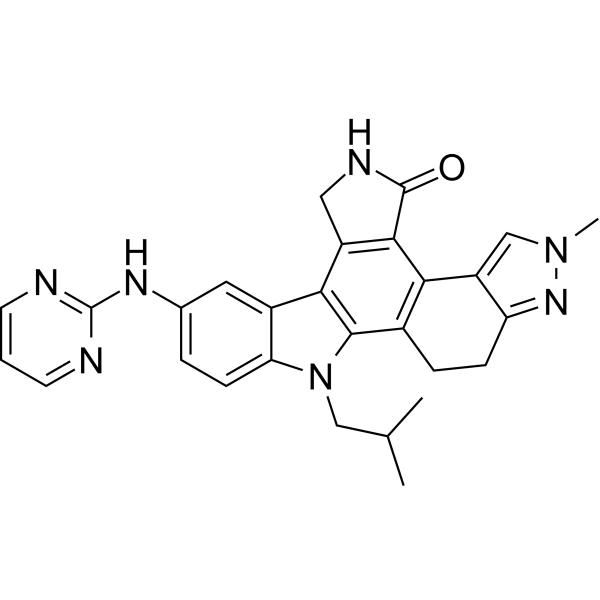
-
- HY-163402
-
|
|
EGFR
Apoptosis
|
Cancer
|
|
EGFR-IN-108 chloride (Compound Ru3S) is an EGFR inhibitor with an IC50 value of 5.8 nM for hEGFR. EGFR-IN-108 chloride induces apoptosis and has anti-proliferative activity against cancer cells. EGFR-IN-108 chloride also has anti-angiogenic effects .
|
-
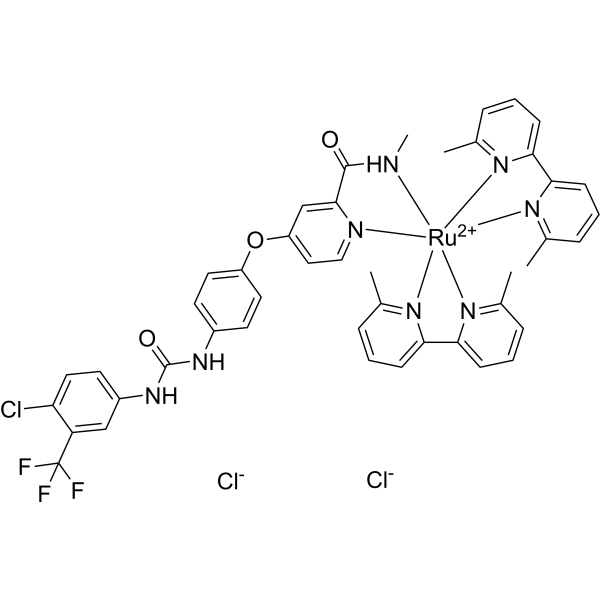
-
- HY-17514S
-
|
R51211-d5
|
Fungal
Hedgehog
Cytochrome P450
Autophagy
Antibiotic
|
Infection
Cancer
|
|
Itraconazole-d5 is the deuterium labeled Itraconazole. Itraconazole (R51211) is a triazole antifungal agent and a potent and orally active Hedgehog (Hh) signaling pathway antagonist with an IC50 of ~800 nM. Itraconazole potently inhibits lanosterol 14α-demethylase (cytochrome P450 enzyme), thereby inhibits the oxidative conversion of lanosterol to ergosterol. Itraconazole has anticancer and antiangiogenic effects[1][2][3].
|
-
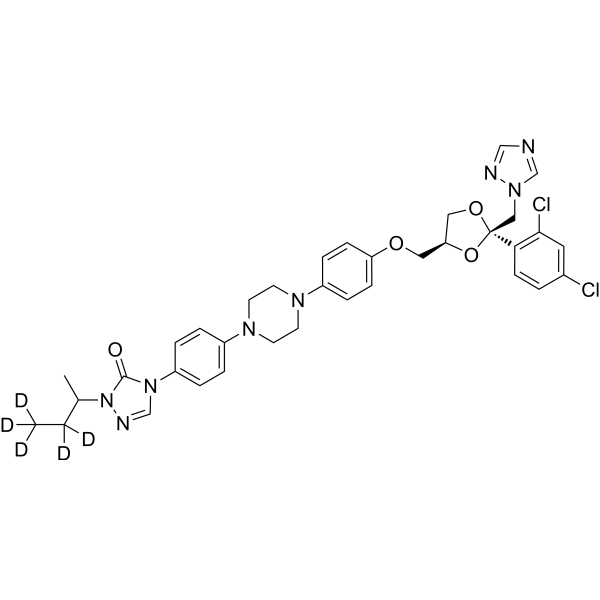
-
- HY-17364S
-
|
|
DNA Alkylator/Crosslinker
Autophagy
Apoptosis
|
Cancer
|
|
Temozolomide-d3 is the deuterium labeled Temozolomide. Temozolomide (NSC 362856) is an oral active DNA alkylating agent that crosses the blood-brain barrier. Temozolomide is also a proautophagic and proapoptotic agent. Temozolomide is effective against tumor cells that are characterized by low levels of O6-alkylguanine DNA alkyltransferase (OGAT) and a functional mismatch repair system. Temozolomide has antitumor and antiangiogenic effects[1][2].
|
-
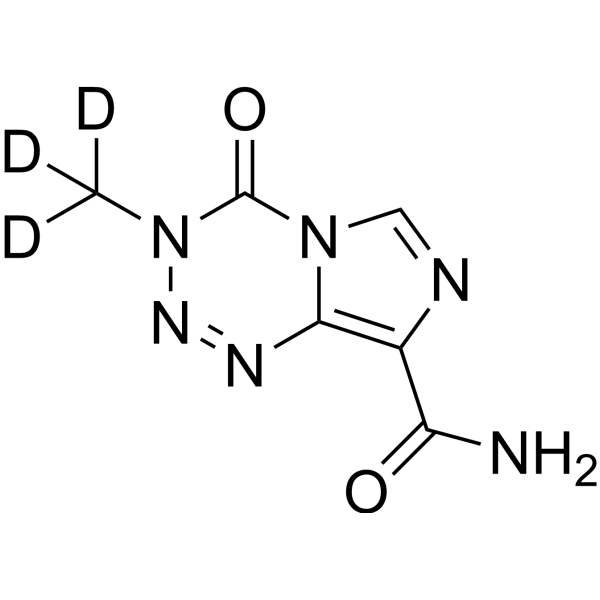
-
- HY-B0421S2
-
|
Mycophenolate-13C17
|
Isotope-Labeled Compounds
Flavivirus
|
Cancer
|
|
Mycophenolic acid-13C17 (Mycophenolate-13C17) is the 13C labeled Mycophenolic acid (HY-B0421). Mycophenolic acid is a potent uncompetitive inosine monophosphate dehydrogenase (IMPDH) inhibitor with an EC50 of 0.24 μM. Mycophenolic acid demonstrates antiviral effects against a wide range of RNA viruses including influenza. Mycophenolic acid is an immunosuppressive agent. Antiangiogenic and antitumor effects.
|
-
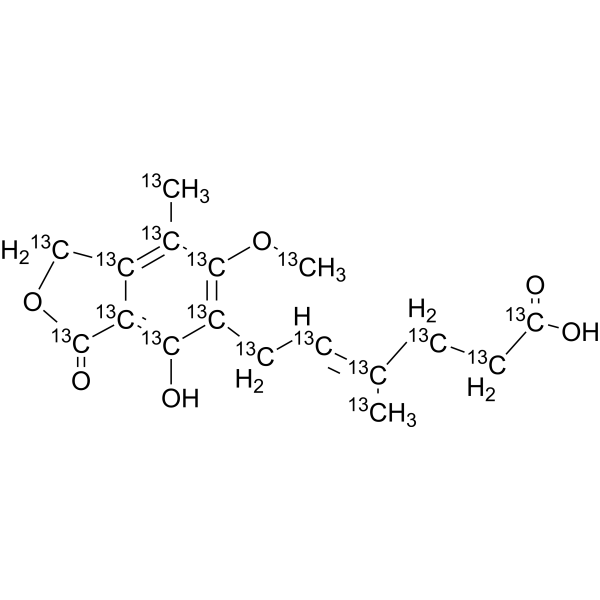
-
- HY-16125
-
|
L-651582 Orotate; CAI Orotate
|
Calcium Channel
|
Inflammation/Immunology
Cancer
|
|
Carboxyamidotriazole Orotate (L-651582 Orotate) is the orotate salt form of Carboxyamidotriazole (CAI), an orally bioavailable signal transduction inhibitor. Carboxyamidotriazole Orotate is a cytostatic inhibitor of nonvoltage-operated calcium channels and calcium channel-mediated signaling pathways. Carboxyamidotriazole Orotate shows anti-tumor, anti-inflammatory and antiangiogenic effects .
|
-
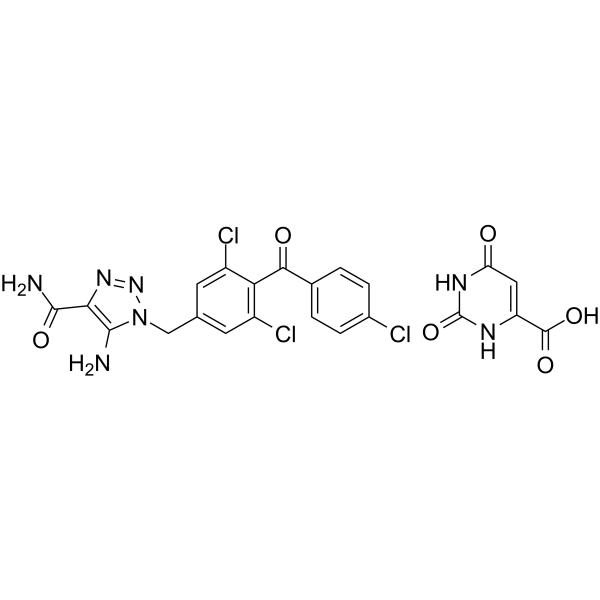
-
- HY-N5077
-
|
|
Cholinesterase (ChE)
P-glycoprotein
|
Neurological Disease
Inflammation/Immunology
Cancer
|
|
Sinapine is an alkaloid isolated from seeds of the cruciferous species. Sinapine exhibits anti-inflammatory, anti-oxidant, anti-tumor, anti-angiogenic and radio-protective effects. Sinapine is also an acetylcholinesterase (AChE) inhibitor and can be used for the research of Alzheimer’s disease, ataxia, myasthenia gravis, and Parkinson’s disease .
|
-
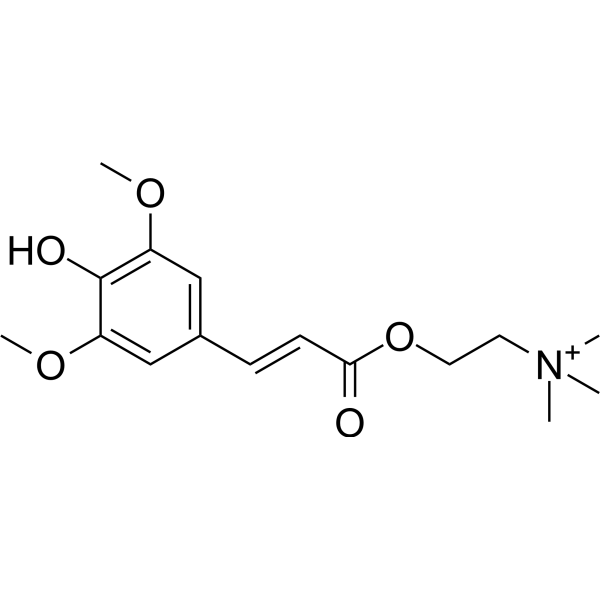
-
- HY-112151
-
|
|
Complement System
|
Cancer
|
|
EG01377 is a potent, bioavailable and selective inhibitor of neuropilin-1 (NRP1), with a Kd of 1.32 μM, and IC50s of both 609 nM for NRP1-a1 and NRP1-b1. EG01377 has antiangiogenic, antimigratory, and antitumor effects .
|
-
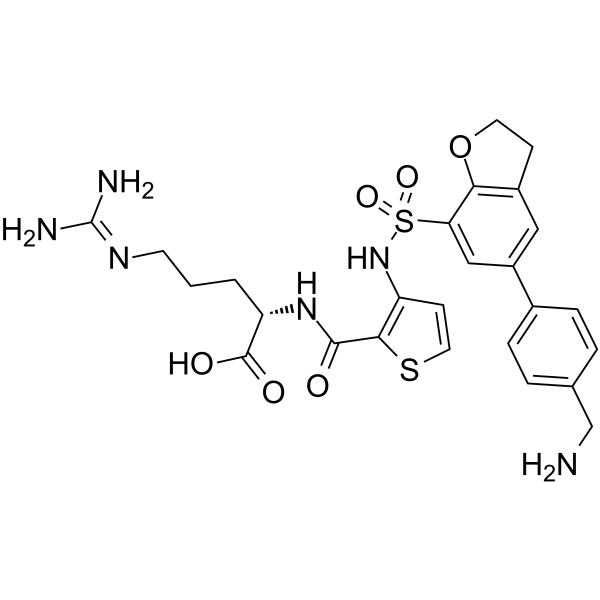
-
- HY-112151A
-
|
|
Complement System
|
Cancer
|
|
EG01377 dihydrochloride is a potent, bioavailable and selective inhibitor of neuropilin-1 (NRP1), with a Kd of 1.32 μM, and IC50s of 609 nM for both NRP1-a1 and NRP1-b1. EG01377 dihydrochloride has antiangiogenic, antimigratory, and antitumor effects .
|
-
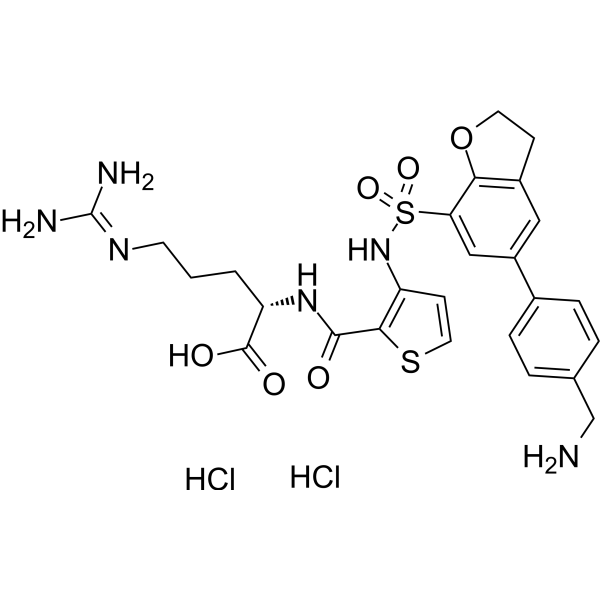
-
- HY-113649
-
|
|
HIF/HIF Prolyl-Hydroxylase
|
Cancer
|
|
AKB-6899, a prolyl hydroxylase domain 3 (PHD3) inhibitor, is a selective HIF-2α stabilizer. AKB-6899 also increases soluble form of the VEGF receptor (sVEGFR-1) production from GM-CSF-treated macrophages, and has antitumor and antiangiogenic effects .
|
-
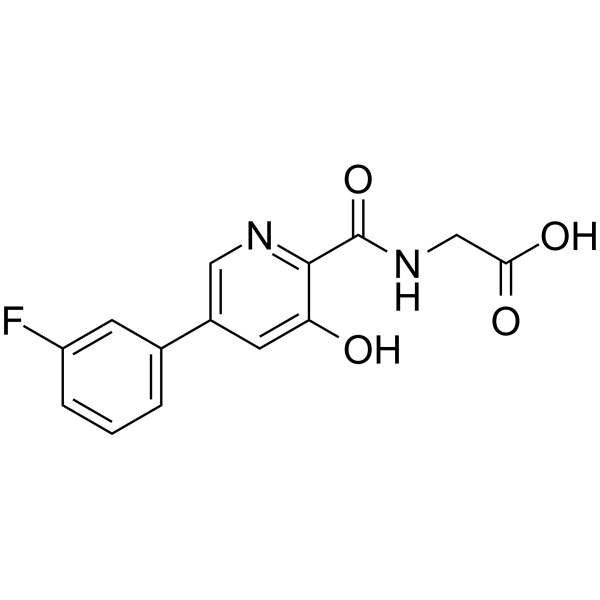
-
- HY-N0005
-
|
Diferuloylmethane; Natural Yellow 3; Turmeric yellow
|
Histone Acetyltransferase
Epigenetic Reader Domain
Keap1-Nrf2
Autophagy
Mitophagy
Influenza Virus
Ferroptosis
|
Cancer
|
|
Curcumin (Diferuloylmethane), a natural phenolic compound, is a p300/CREB-binding protein-specific inhibitor of acetyltransferase, represses the acetylation of histone/nonhistone proteins and histone acetyltransferase-dependent chromatin transcription. Curcumin shows inhibitory effects on NF-κB and MAPKs, and has diverse pharmacologic effects including anti-inflammatory, antioxidant, antiproliferative and antiangiogenic activities. Curcumin induces stabilization of Nrf2 protein through Keap1 cysteine modification.
|
-
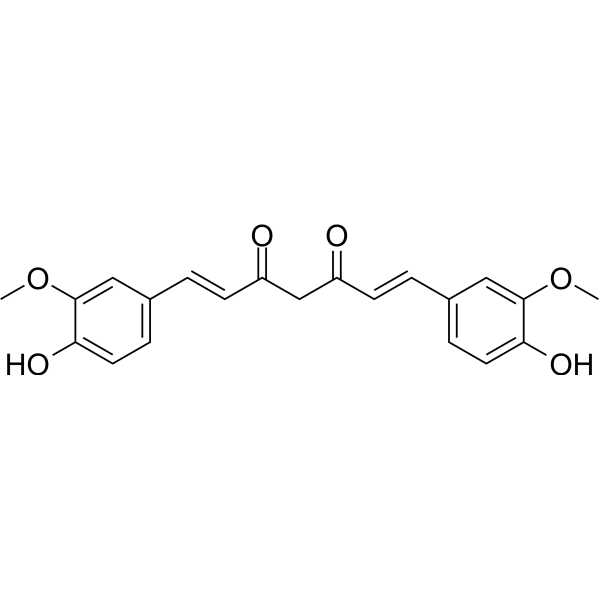
-
- HY-103387
-
|
|
COX
Apoptosis
|
Inflammation/Immunology
Cancer
|
|
DuP-697 is a member of the vicinal diaryl heterocycles and a potent, irreversible, selective and orally active COX-2 inhibitor (IC50 of 10 nM and 800 nM for human COX-2 and COX-1, respectively). DuP-697 exerts antiproliferative (IC50 of 42.8 nM), antiangiogenic and apoptotic effects on HT29 colorectal cancer cells. DuP-697 inhibits prostaglandin synthesis and has anti-inflammatory, anticancer and antipyretic effects .
|
-
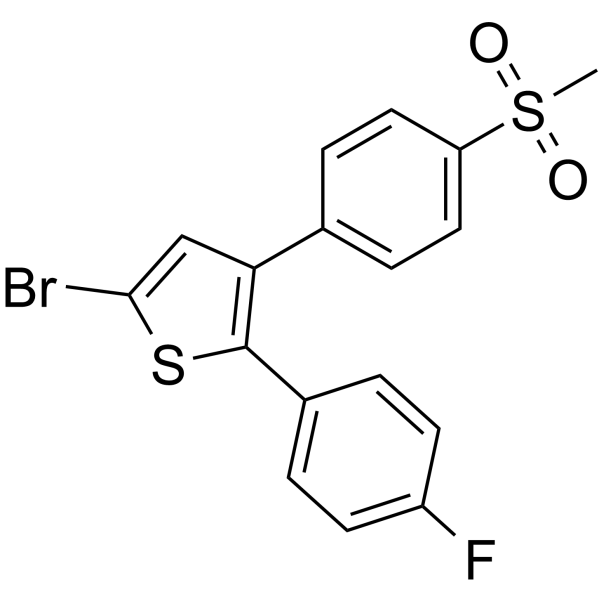
-
- HY-128530
-
|
|
Cuproptosis
Others
|
Cardiovascular Disease
Metabolic Disease
Inflammation/Immunology
|
|
Tetrathiomolybdate, an orally active anti-copper agent, reduces copper levels in the body. Tetrathiomolybdate has a protective effect on collagen-induced arthritis in mice. Tetrathiomolybdate also reduces blood sugar, but has no effect on mice with hereditary diabetes (db/db). Tetrathiomolybdate inhibit angiogenesis, also shows antiangiogenic effects in malignant pleural mesothelioma .
|
-
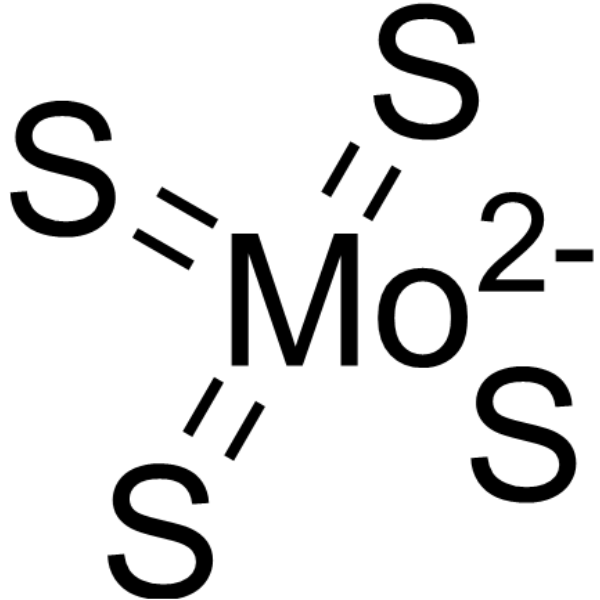
-
- HY-N6924
-
|
|
HIV
|
Infection
Metabolic Disease
|
|
Zingibroside R1 is dammaranae-type triterpenoid saponin, isolated from rhizomes, taproots, and lateral roots of Panax japonicas C. A. Meyer, shows excellent anti-tumor effects as well as anti-angiogenic activity .
Zingibroside R1 possesses some anti-HIV-1 activity.
Zingibroside R1 has inhibitory effects on the 2-deoxy-D-glucose (2-DG) uptake by EAT cells (IC50=91.3 μM) .
|
-
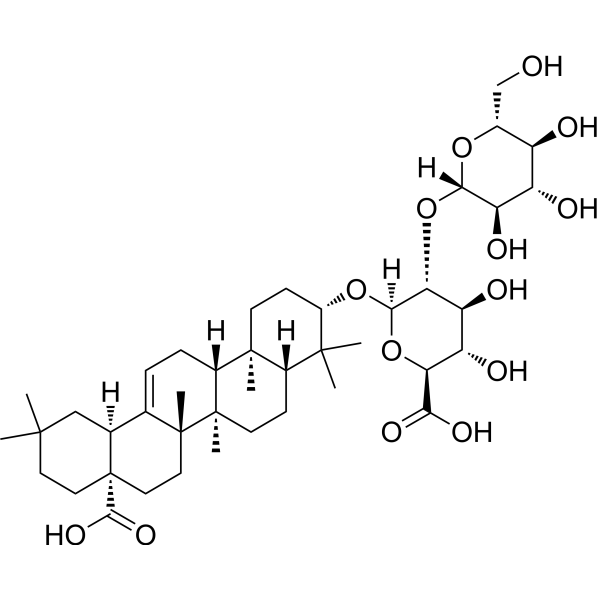
-
- HY-15205
-
|
STA-9090
|
HSP
Apoptosis
|
Cancer
|
|
Ganetespib (STA-9090) is a heat shock protein 90 (HSP90) inhibitor which exhibits potent cytotoxicity in a wide variety of hematological and solid tumor cell lines. Ganetespib has antiangiogenic effects in colorectal cancer mediated through inhibition of HIF-1α and STAT3 .
|
-
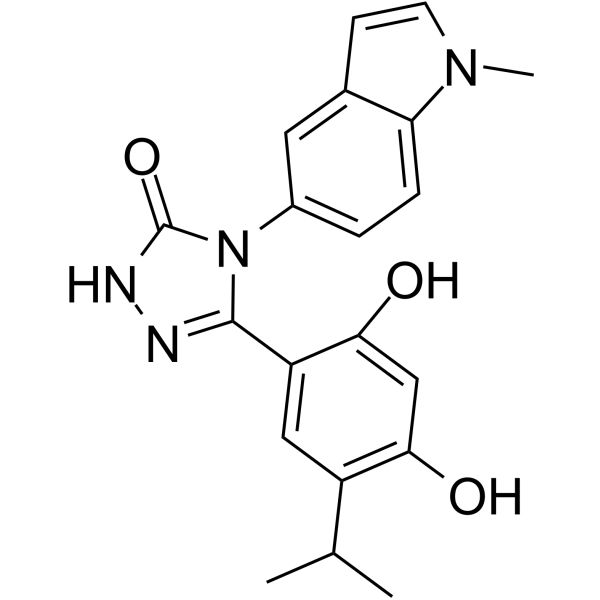
-
- HY-17364
-
Temozolomide
Maximum Cited Publications
109 Publications Verification
NSC 362856; CCRG 81045; TMZ
|
DNA Alkylator/Crosslinker
Autophagy
Apoptosis
|
Cancer
|
|
Temozolomide (NSC 362856) is an oral active DNA alkylating agent that crosses the blood-brain barrier. Temozolomide is also a proautophagic and proapoptotic agent. Temozolomide is effective against tumor cells that are characterized by low levels of O6-alkylguanine DNA alkyltransferase (OGAT) and a functional mismatch repair system. Temozolomide has antitumor and antiangiogenic effects .
|
-
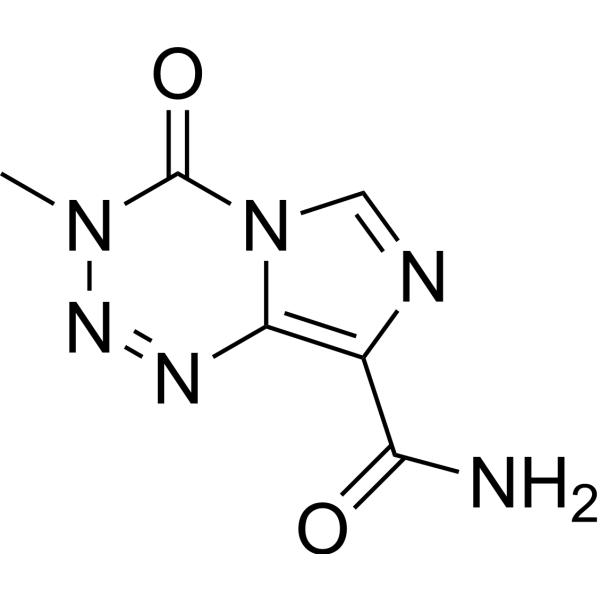
-
- HY-N0450
-
|
|
P-glycoprotein
Cholinesterase (ChE)
|
Cancer
|
|
Sinapine thiocyanate is an alkaloid isolated from seeds of the cruciferous species. Sinapine thiocyanate exhibits anti-inflammatory, anti-oxidant, anti-tumor, anti-angiogenic and radio-protective effects. Sinapine thiocyanate is also an acetylcholinesterase (AChE) inhibitor and can be used for the research of Alzheimer’s disease, ataxia, myasthenia gravis, and Parkinson’s disease .
|
-
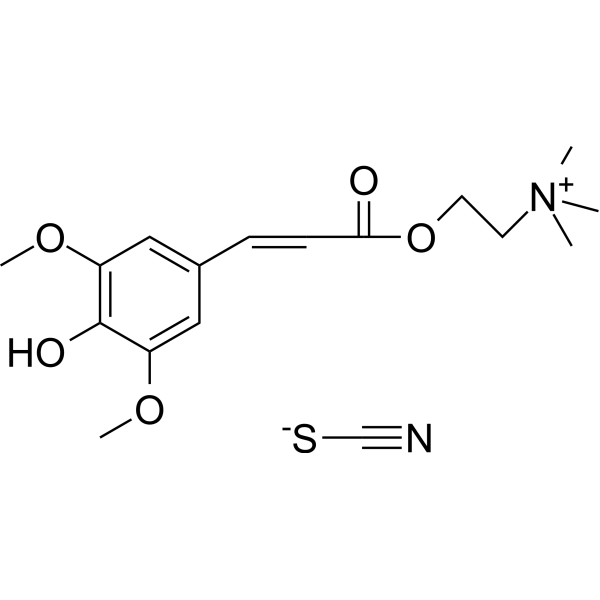
-
- HY-N5077B
-
|
|
Cholinesterase (ChE)
P-glycoprotein
|
Neurological Disease
Inflammation/Immunology
Cancer
|
|
Sinapine hydroxide is an alkaloid isolated from seeds of the cruciferous species. Sinapine hydroxide exhibits anti-inflammatory, anti-oxidant, anti-tumor, anti-angiogenic and radio-protective effects. Sinapine hydroxide is also an acetylcholinesterase (AChE) inhibitor and can be used for the research of Alzheimer’s disease, ataxia, myasthenia gravis, and Parkinson’s disease .
|
-
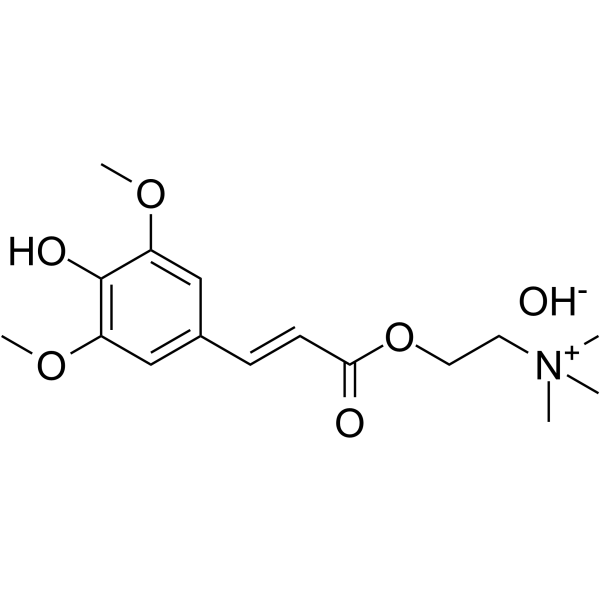
-
- HY-17514
-
|
R51211
|
Fungal
Hedgehog
Cytochrome P450
Autophagy
Antibiotic
Bacterial
|
Infection
Cancer
|
|
Itraconazole (R51211) is a triazole antifungal agent and a potent and orally active Hedgehog (Hh) signaling pathway antagonist with an IC50 of ~800 nM. Itraconazole potently inhibits lanosterol 14α-demethylase (cytochrome P450 enzyme), thereby inhibits the oxidative conversion of lanosterol to ergosterol. Itraconazole has anticancer and antiangiogenic effects. Itraconazole is a oxysterol-binding protein (OSBP) inhibitor .
|
-
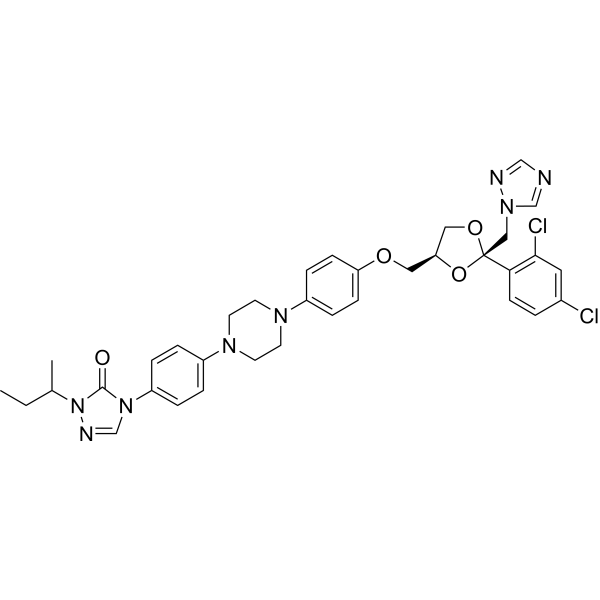
-
- HY-19827
-
|
(+)-Aeroplysinin-1
|
Bacterial
HIV
Apoptosis
|
Infection
Cancer
|
|
Aeroplysinin 1 ((+)-Aeroplysinin-1), a secondary metabolite isolated from marine sponges, shows potent antibiotic effects on Gram-positive bacteria and exerts antiviral activity against HIV-1 (IC50=14.6 μM). Aeroplysinin 1 has anti-inflammatory, anti-angiogenic and anti-tumor activities. Aeroplysinin 1 induces apoptosis in endothelial cells .
|
-
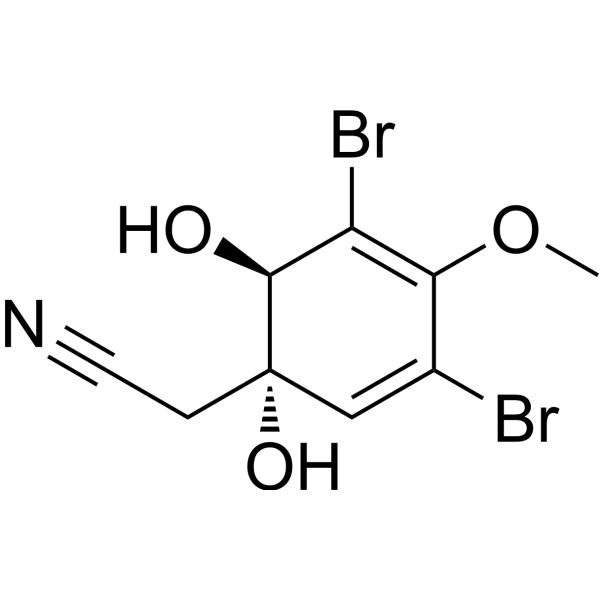
-
- HY-W592871
-
|
10-HDA
|
mTOR
|
Cardiovascular Disease
Inflammation/Immunology
Cancer
|
|
10-Hydroxy-2-decenoic acid (10-HDA) is the major lipid component of royal jelly produced by honeybees. 10-Hydroxy-2-decenoic acid has several health-beneficial effects in mammals, such as antitumor activity, anti-inflammatory activity, and antiangiogenic activity. 10-Hydroxy-2-decenoic acid also extends the lifespan of C. elegans .
|
-
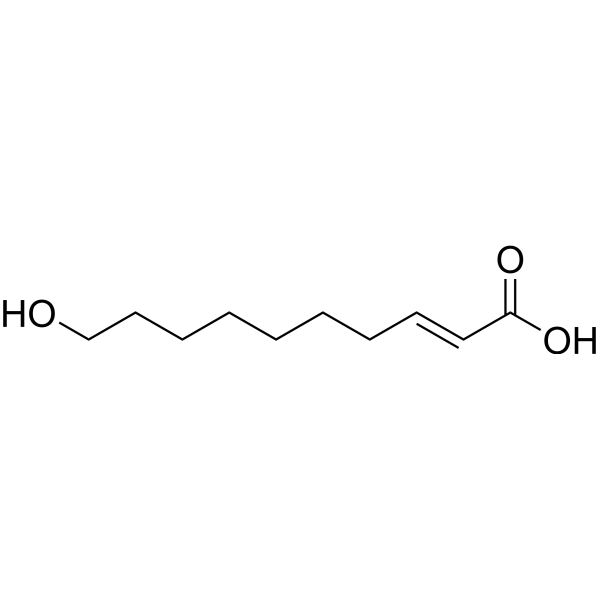
-
- HY-B0965A
-
|
|
|
|
|
Thioridazine, an antagonist of the dopamine receptor D2 family proteins, exhibits potent anti-psychotic and anti-anxiety activities. Thioridazine is also a potent inhibitor of PI3K-Akt-mTOR signaling pathways with anti-angiogenic effect. Thioridazine shows antiproliferative and apoptosis induction effects in various types of cancer cells, with specificity on targeting cancer stem cells (CSCs) .
|
-
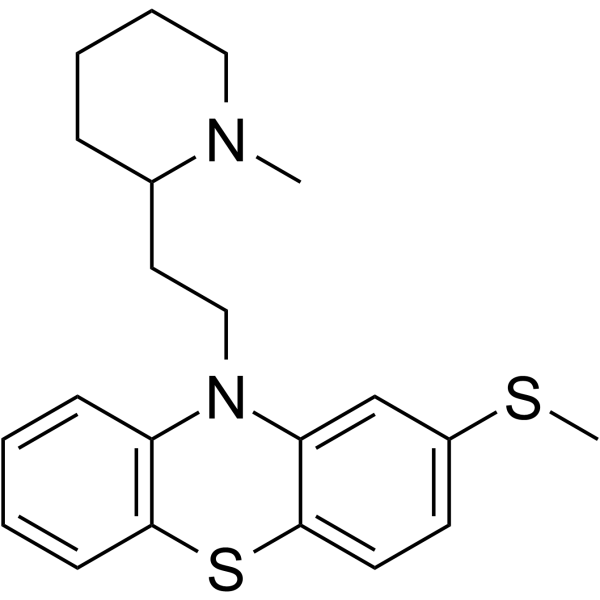
-
- HY-B0965
-
|
|
Dopamine Receptor
Apoptosis
5-HT Receptor
Autophagy
Bacterial
|
Infection
Neurological Disease
Cancer
|
|
Thioridazine hydrochloride, an orally active antagonist of the dopamine receptor D2 family proteins, exhibits potent anti-psychotic and anti-anxiety activities. Thioridazine hydrochloride is also a potent inhibitor of PI3K-Akt-mTOR signaling pathways with anti-angiogenic effect. Thioridazine hydrochloride shows antiproliferative and apoptosis induction effects in various types of cancer cells, with specificity on targeting cancer stem cells (CSCs) .
|
-
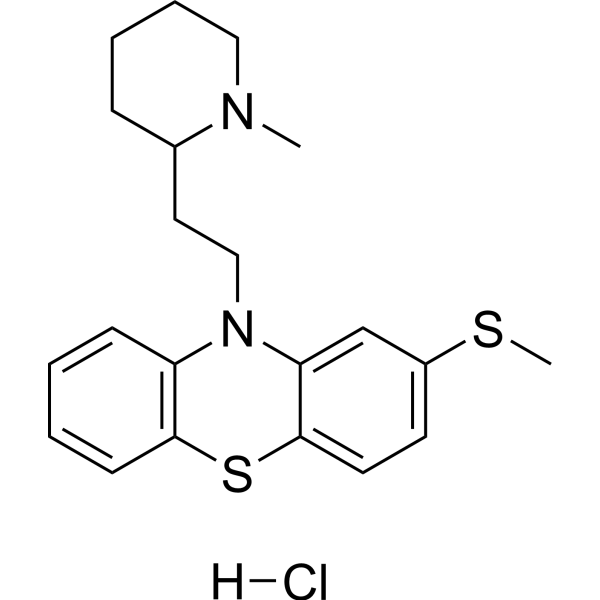
-
- HY-D0803
-
|
|
Apoptosis
VEGFR
PI3K
Akt
|
Infection
Cardiovascular Disease
Neurological Disease
Inflammation/Immunology
Cancer
|
|
Thymoquinone is an orally active natural product isolated from N. sativa Thymoquinone down-regulates the VEGFR2-PI3K-Akt pathway. Thymoquinone has antioxidant, anti-inflammatory, anticancer, antiviral, anticonvulsant, antifungal, antiviral, antiangiogenic activity and hepatoprotective effects. Thymoquinone can be used to study Alzheimer's disease, cancer, cardiovascular disease, infectious disease and inflammation .
|
-
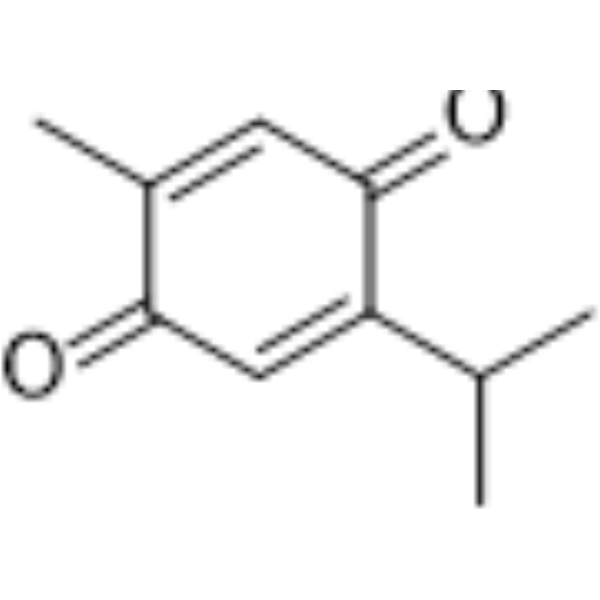
-
- HY-17514S2
-
|
R51211-d9
|
Fungal
Hedgehog
Bacterial
Autophagy
Cytochrome P450
Antibiotic
|
|
|
Itraconazole-d9 is the deuterium labeled Itraconazole[1]. Itraconazole (R51211) is a triazole antifungal agent and a potent and orally active Hedgehog (Hh) signaling pathway antagonist with an IC50 of ~800 nM. Itraconazole potently inhibits lanosterol 14α-demethylase (cytochrome P450 enzyme), thereby inhibits the oxidative conversion of lanosterol to ergosterol. Itraconazole has anticancer and antiangiogenic effects. Itraconazole is a oxysterol-binding protein (OSBP) inhibitor[2][3][4][5].
|
-
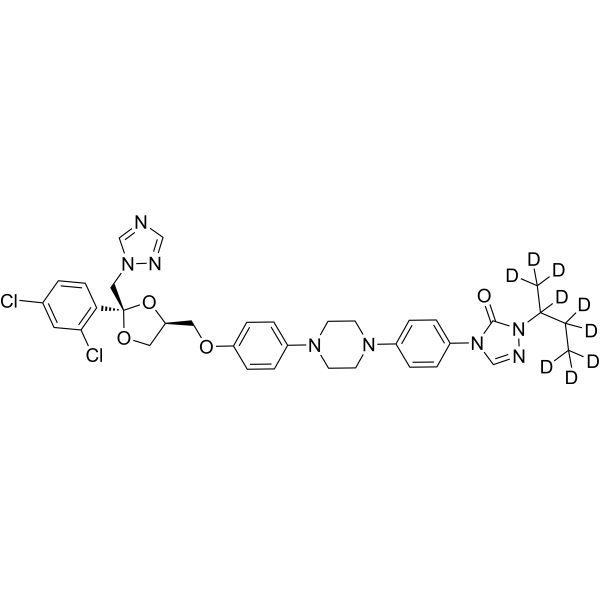
-
- HY-B0965AS
-
|
|
Dopamine Receptor
Apoptosis
5-HT Receptor
Autophagy
Bacterial
|
Neurological Disease
|
|
Thioridazine-d3 (hydrochloride) is the deuterium labeled Thioridazine. Thioridazine, an antagonist of the dopamine receptor D2 family proteins, exhibits potent anti-psychotic and anti-anxiety activities. Thioridazine is also a potent inhibitor of PI3K-Akt-mTOR signaling pathways with anti-angiogenic effect. Thioridazine shows antiproliferative and apoptosis induction effects in various types of cancer cells, with specificity on targeting cancer stem cells (CSCs)[1][2][3][4].
|
-
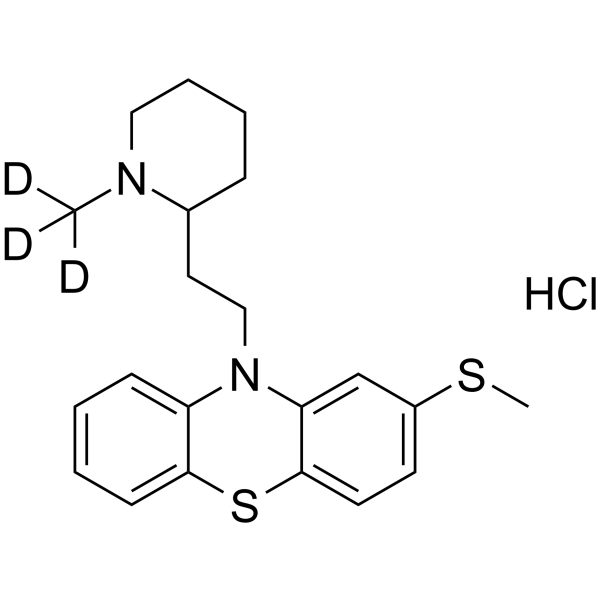
-
- HY-107146
-
|
P1pal-7
|
Protease Activated Receptor (PAR)
|
Cardiovascular Disease
Cancer
|
|
PZ-128 (P1pal-7), a cell-penetrating lipopeptide pepducin, is a first-in-class, specific and reversible protease-activated receptor-1 (PAR1) antagonist. PZ-128 targets the cytoplasmic surface of PAR1 and interrupts signaling to internally-located G (PAR1-G) proteins. PZ-128 has antiplatelet, anti-metastatic, anti-angiogenic and anticancer effects .
|
-
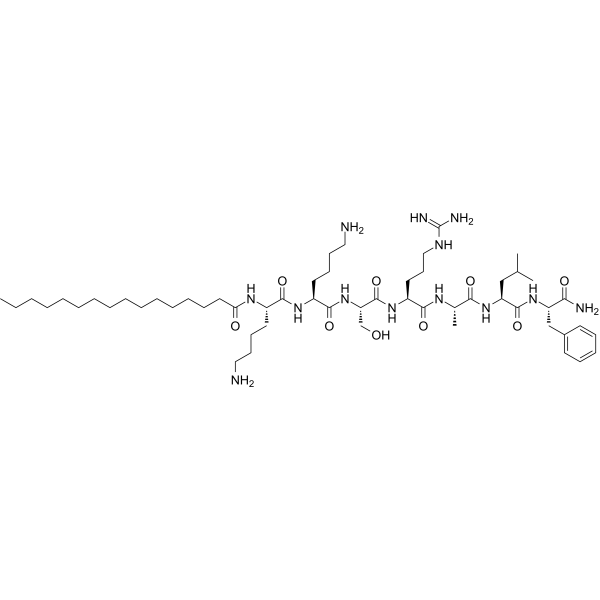
-
- HY-B0965R
-
|
|
Dopamine Receptor
Apoptosis
5-HT Receptor
Autophagy
Bacterial
|
Infection
Neurological Disease
Cancer
|
|
Thioridazine (hydrochloride) (Standard) is the analytical standard of Thioridazine (hydrochloride). This product is intended for research and analytical applications. Thioridazine hydrochloride, an orally active antagonist of the dopamine receptor D2 family proteins, exhibits potent anti-psychotic and anti-anxiety activities. Thioridazine hydrochloride is also a potent inhibitor of PI3K-Akt-mTOR signaling pathways with anti-angiogenic effect. Thioridazine hydrochloride shows antiproliferative and apoptosis induction effects in various types of cancer cells, with specificity on targeting cancer stem cells (CSCs) .
|
-
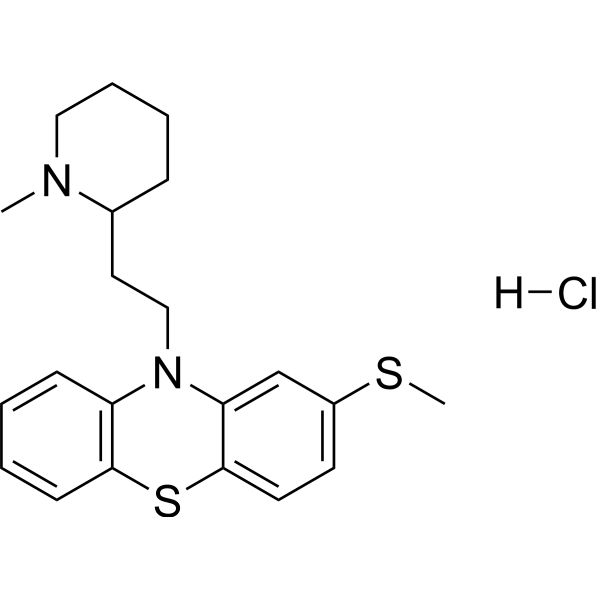
-
- HY-N0668
-
|
|
GLUT
Amylases
NF-κB
|
Metabolic Disease
Inflammation/Immunology
Cancer
|
|
Rubusoside is a diterpene glycoside that is also a sweetener and solubilizer with anti-angiogenic, anti-cancer, anti-obesity, anti-allergic and anti-asthmatic effects. Rubusoside attenuates airway hyperresponsiveness and reduces inflammatory cells in bronchoalveolar lavage fluid (BALF), reducing OVA (HY-W250978)-induced airway inflammation. Rubusoside also prevents palmitic acid-induced lipotoxicity in pancreatic INS-1 cells, reduces the transport of human glucose transporters GLUT-1 and fructose GLUT-5, and inhibits NF-κB and α-amylase (α-amylase) .
|
-
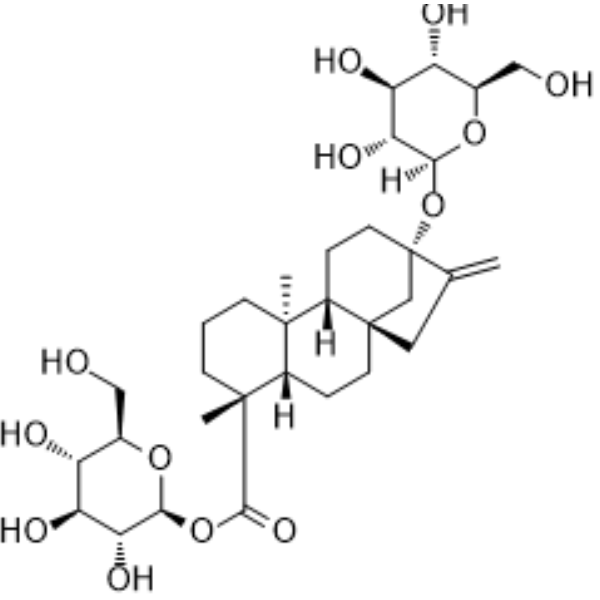
-
- HY-12403A
-
|
TXA127 acetate; Angiotensin (1-7) (acetate); Ang-(1-7) (acetate)
|
Angiotensin Receptor
Angiotensin-converting Enzyme (ACE)
Endogenous Metabolite
|
Cardiovascular Disease
Inflammation/Immunology
Endocrinology
|
|
Angiotensin 1-7 (Ang-(1-7)) acetate is an endogenous heptapeptide from the renin-angiotensin system (RAS) with a cardioprotective role due to its anti-inflammatory and anti-fibrotic activities in cardiac cells. Angiotensin 1-7 acetate inhibits purified canine ACE activity (IC50=0.65 μM). Angiotensin 1-7 acetate acts as a local synergistic modulator of kinin-induced vasodilation by inhibiting ACE and releasing nitric oxide. Angiotensin 1-7 acetate blocks Ang II-induced smooth muscle cell proliferation and hypertrophy and shows antiangiogenic and growth-inhibitory effects on the endothelium .
|
-
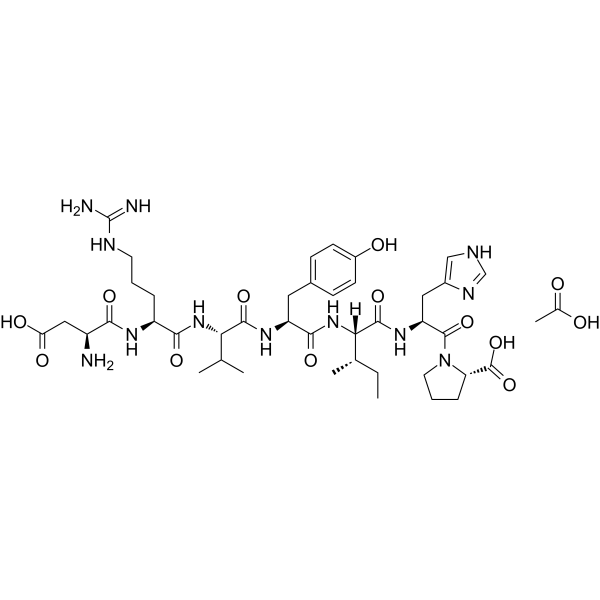
-
- HY-12403
-
|
TXA127; Angiotensin (1-7); Ang-(1-7)
|
Angiotensin Receptor
Angiotensin-converting Enzyme (ACE)
Endogenous Metabolite
|
Cardiovascular Disease
Inflammation/Immunology
Endocrinology
|
|
Angiotensin 1-7 (Ang-(1-7)) is an endogenous heptapeptide from the renin-angiotensin system (RAS) with a cardioprotective role due to its anti-inflammatory and anti-fibrotic activities in cardiac cells. Angiotensin 1-7 inhibits purified canine ACE activity (IC50=0.65 μM). Angiotensin 1-7 acts as a local synergistic modulator of kinin-induced vasodilation by inhibiting ACE and releasing nitric oxide. Angiotensin 1-7 blocks Ang II-induced smooth muscle cell proliferation and hypertrophy and shows antiangiogenic and growth-inhibitory effects on the endothelium. Angiotensin 1-7 shows anti-inflammatory activity .
|
-
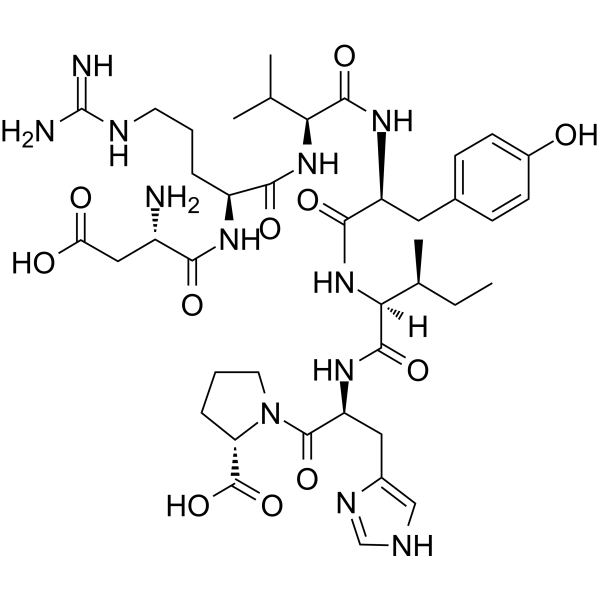
| Cat. No. |
Product Name |
Target |
Research Area |
-
- HY-107146
-
|
P1pal-7
|
Protease Activated Receptor (PAR)
|
Cardiovascular Disease
Cancer
|
|
PZ-128 (P1pal-7), a cell-penetrating lipopeptide pepducin, is a first-in-class, specific and reversible protease-activated receptor-1 (PAR1) antagonist. PZ-128 targets the cytoplasmic surface of PAR1 and interrupts signaling to internally-located G (PAR1-G) proteins. PZ-128 has antiplatelet, anti-metastatic, anti-angiogenic and anticancer effects .
|
-
- HY-12403A
-
|
TXA127 acetate; Angiotensin (1-7) (acetate); Ang-(1-7) (acetate)
|
Angiotensin Receptor
Angiotensin-converting Enzyme (ACE)
Endogenous Metabolite
|
Cardiovascular Disease
Inflammation/Immunology
Endocrinology
|
|
Angiotensin 1-7 (Ang-(1-7)) acetate is an endogenous heptapeptide from the renin-angiotensin system (RAS) with a cardioprotective role due to its anti-inflammatory and anti-fibrotic activities in cardiac cells. Angiotensin 1-7 acetate inhibits purified canine ACE activity (IC50=0.65 μM). Angiotensin 1-7 acetate acts as a local synergistic modulator of kinin-induced vasodilation by inhibiting ACE and releasing nitric oxide. Angiotensin 1-7 acetate blocks Ang II-induced smooth muscle cell proliferation and hypertrophy and shows antiangiogenic and growth-inhibitory effects on the endothelium .
|
-
- HY-12403
-
|
TXA127; Angiotensin (1-7); Ang-(1-7)
|
Angiotensin Receptor
Angiotensin-converting Enzyme (ACE)
Endogenous Metabolite
|
Cardiovascular Disease
Inflammation/Immunology
Endocrinology
|
|
Angiotensin 1-7 (Ang-(1-7)) is an endogenous heptapeptide from the renin-angiotensin system (RAS) with a cardioprotective role due to its anti-inflammatory and anti-fibrotic activities in cardiac cells. Angiotensin 1-7 inhibits purified canine ACE activity (IC50=0.65 μM). Angiotensin 1-7 acts as a local synergistic modulator of kinin-induced vasodilation by inhibiting ACE and releasing nitric oxide. Angiotensin 1-7 blocks Ang II-induced smooth muscle cell proliferation and hypertrophy and shows antiangiogenic and growth-inhibitory effects on the endothelium. Angiotensin 1-7 shows anti-inflammatory activity .
|
-
- HY-P4324
-
|
|
Peptides
|
Cardiovascular Disease
|
|
Cys-Asp-Pro-Gly-Tyr-Ile-Gly-Ser-Arg-NH2 is a linear peptide from laminin B1 chain that interferes with tumor cell attachment and invasion into basement membrane and has anti-angiogenic effects .
|
| Cat. No. |
Product Name |
Target |
Research Area |
-
- HY-P99330
-
|
Anti-Human VEGFA Recombinant Antibody; RO5520985
|
VEGFR
Tie
|
Cancer
|
|
Vanucizumab is a first-in-class, bispecific IgG1-like monoclonal antibody that simultaneously blocks VEGF-A and angiopoietin-2 (Ang-2) from interacting with their receptors. Vanucizumab has antiangiogenic and anticancer effects .
|
-
- HY-P9928
-
|
REGN 727; SAR 236553
|
Ser/Thr Protease
|
Cardiovascular Disease
|
|
Alirocumab (REGN 727) is a human monoclonal antibody inhibitor of PCSK9. Alirocumab is a monoclonal antibody. Alirocumab has anti-inflammatory, antiangiogenic and antioxidant effects. Alirocumab can be used in the study of hypercholesterolemia .
|
| Cat. No. |
Product Name |
Category |
Target |
Chemical Structure |
-
- HY-B0421
-
-

-
- HY-N0205
-
-

-
- HY-N2165
-
-

-
- HY-N7830
-
-

-
- HY-B0421A
-
-

-
- HY-N5077
-
-

-
- HY-N0005
-
-

-
- HY-N6924
-
-

-
- HY-N0450
-
-

-
- HY-N5077B
-
-

-
- HY-19827
-
-

-
- HY-W592871
-
|
10-HDA
|
Structural Classification
Animals
Ketones, Aldehydes, Acids
Source classification
|
mTOR
|
|
10-Hydroxy-2-decenoic acid (10-HDA) is the major lipid component of royal jelly produced by honeybees. 10-Hydroxy-2-decenoic acid has several health-beneficial effects in mammals, such as antitumor activity, anti-inflammatory activity, and antiangiogenic activity. 10-Hydroxy-2-decenoic acid also extends the lifespan of C. elegans .
|
-

-
- HY-D0803
-
|
|
Quinones
Structural Classification
Classification of Application Fields
Nigella sativa L.
Ranunculaceae
Benzene Quinones
Plants
Inflammation/Immunology
Disease Research Fields
|
Apoptosis
VEGFR
PI3K
Akt
|
|
Thymoquinone is an orally active natural product isolated from N. sativa Thymoquinone down-regulates the VEGFR2-PI3K-Akt pathway. Thymoquinone has antioxidant, anti-inflammatory, anticancer, antiviral, anticonvulsant, antifungal, antiviral, antiangiogenic activity and hepatoprotective effects. Thymoquinone can be used to study Alzheimer's disease, cancer, cardiovascular disease, infectious disease and inflammation .
|
-

-
- HY-N0668
-
-

-
- HY-12403A
-
-

-
- HY-12403
-
-

| Cat. No. |
Product Name |
Chemical Structure |
-
- HY-N0005S
-
|
|
|
Curcumin-d6is a deuterium labeled Curcumin (Turmeric yellow). Curcumin (Turmeric yellow) is a natural phenolic compound with diverse pharmacologic effects including anti-inflammatory, antioxidant, antiproliferative and antiangiogenic activities. Curcumin is an inhibitor of p300 histone acetylatransferase (HATs) and also shows inhibitory effects on NF-κB and MAPKs.
|
-

-
- HY-17514S
-
|
|
|
Itraconazole-d5 is the deuterium labeled Itraconazole. Itraconazole (R51211) is a triazole antifungal agent and a potent and orally active Hedgehog (Hh) signaling pathway antagonist with an IC50 of ~800 nM. Itraconazole potently inhibits lanosterol 14α-demethylase (cytochrome P450 enzyme), thereby inhibits the oxidative conversion of lanosterol to ergosterol. Itraconazole has anticancer and antiangiogenic effects[1][2][3].
|
-

-
- HY-17364S
-
|
|
|
Temozolomide-d3 is the deuterium labeled Temozolomide. Temozolomide (NSC 362856) is an oral active DNA alkylating agent that crosses the blood-brain barrier. Temozolomide is also a proautophagic and proapoptotic agent. Temozolomide is effective against tumor cells that are characterized by low levels of O6-alkylguanine DNA alkyltransferase (OGAT) and a functional mismatch repair system. Temozolomide has antitumor and antiangiogenic effects[1][2].
|
-

-
- HY-B0421S2
-
|
|
|
Mycophenolic acid-13C17 (Mycophenolate-13C17) is the 13C labeled Mycophenolic acid (HY-B0421). Mycophenolic acid is a potent uncompetitive inosine monophosphate dehydrogenase (IMPDH) inhibitor with an EC50 of 0.24 μM. Mycophenolic acid demonstrates antiviral effects against a wide range of RNA viruses including influenza. Mycophenolic acid is an immunosuppressive agent. Antiangiogenic and antitumor effects.
|
-

-
- HY-17514S2
-
|
|
|
Itraconazole-d9 is the deuterium labeled Itraconazole[1]. Itraconazole (R51211) is a triazole antifungal agent and a potent and orally active Hedgehog (Hh) signaling pathway antagonist with an IC50 of ~800 nM. Itraconazole potently inhibits lanosterol 14α-demethylase (cytochrome P450 enzyme), thereby inhibits the oxidative conversion of lanosterol to ergosterol. Itraconazole has anticancer and antiangiogenic effects. Itraconazole is a oxysterol-binding protein (OSBP) inhibitor[2][3][4][5].
|
-

-
- HY-B0965AS
-
|
|
|
Thioridazine-d3 (hydrochloride) is the deuterium labeled Thioridazine. Thioridazine, an antagonist of the dopamine receptor D2 family proteins, exhibits potent anti-psychotic and anti-anxiety activities. Thioridazine is also a potent inhibitor of PI3K-Akt-mTOR signaling pathways with anti-angiogenic effect. Thioridazine shows antiproliferative and apoptosis induction effects in various types of cancer cells, with specificity on targeting cancer stem cells (CSCs)[1][2][3][4].
|
-

Your information is safe with us. * Required Fields.
Inquiry Information
- Product Name:
- Cat. No.:
- Quantity:
- MCE Japan Authorized Agent:

























































